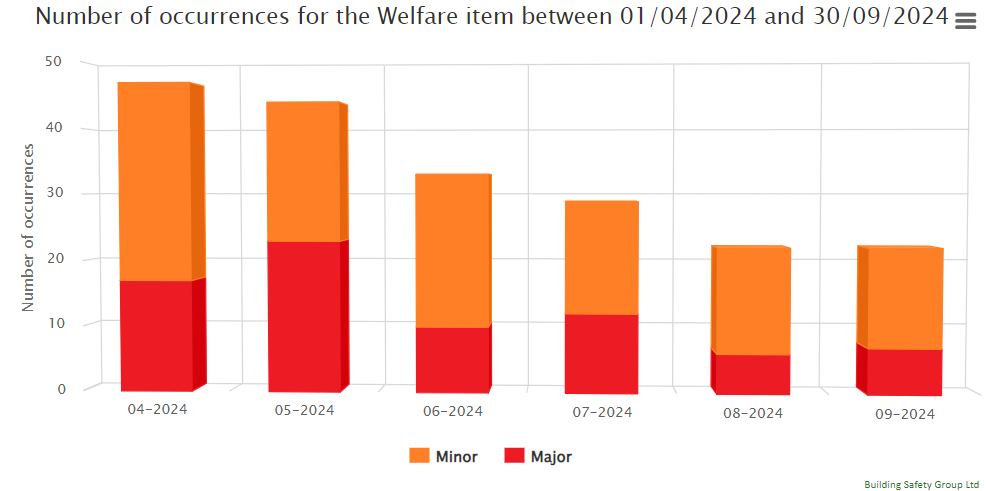18 November 2024
BSG reports 41% drop in Welfare breaches on construction sites
The Building Safety Group (BSG) has reported a 41% drop in welfare breaches recorded on construction sites. The figure was calculated using the data collected from 7,000 BSG site inspections which compared Q2 with Q3 this year.

The significant reduction in the number of breaches reported has been attributed to the positive response from members, who have been acting on the advice and guidance provided by BSG Safety Advisers about ‘Welfare Provision’. BSG’s latest report was preceded by the HSE’s updated guidance on ‘Construction Welfare Standards’, which outlines what HSE Inspectors expect and require from building site managers when they visit.
Good provision of welfare facilities is fundamental in safeguarding the health and well-being of construction workers. Contractors (including Principal Contractors) and Clients have a legal duty under ‘The Construction (Design and Management) Regulations’ to ensure the appropriate and adequate welfare facilities are provided at all workplaces. The provision of toilets, drinking water, a supply of cold and hot (or warm) water for washing, changing facilities and somewhere warm to eat and rest is a basic and legal requirement.
It is vital that sites comply with the law to avoid paying fines. A recent court case saw a Cheshire construction company fined £5,000 after it failed to provide workers with adequate welfare facilities.
C.B. Homes Limited was carrying out work at a site in Alpraham when it was visited by the Health and Safety Executive (HSE). The inspection found the company had failed to provide workers with adequate facilities for workers to wash their hands.
Andy Harper, Head of Technical and CDM Support at BSG commented: “Workers need to feel that they are valued, and their health and welfare is taken into consideration by their employer. The law states that welfare facilities need to be arranged on site before any work can begin.
These facilities need to be considered during the planning stages and then maintained to a high standard throughout the entire lifespan of the project.” Andy added “Unfortunately, some construction site owners ignore these requirements and fail to meet the minimum welfare facilities needs on construction sites.
The employees are directly affected in such situations as their productivity and efficiency diminish when they work in environments with no welfare facilities available at work. The employers are also affected, as the reduced productivity and inefficiency of the employees directly affect the results of the construction work.”
Andy also noted: “We have been very pleased, however, at the positive response from BSG members, who have been following our recommendations and advice about welfare provision on site. This has been the main driver for the substantial reduction in the number of ‘Welfare’ noncompliances, recorded during site inspections over the last three months. In addition, it is worth noting how many of our ‘Contractor’ members have been using BSG’s inspection reports to help Principal Contractors identify and address any shortcomings relating to Welfare Provision.”
For more information about how to improve and maintain a high standard of welfare on site, please login to the BSG Hub where you will find our ‘MS21 Health, Safety & Welfare Monitoring Report’ in the Site Management Forms section.
Common ‘Welfare Advisories’ provided during BSG inspections
- Toilets – Sufficient number of toilets for all personnel on site must be provided. The BS 6465 1:2006 code of practice recommends a ratio of 1 toilet to 7 persons on sites where workers are working a 40 hour week and where portable toilets are emptied once a week. Washing facilities – Welfare facilities’ regulations for construction sites include the provision of wash basins and showers. Sinks for hand-washing should always be placed near toilets and food handling areas.
- For dirty work with hazardous materials, showers must be placed at a distance from the main facilities. There are special site welfare requirements for certain activities, such as working with lead or asbestos.
- Drinking water should be available to all workers on site.
- Changing rooms and lockers are a requirement on all sites. Secure storage for clothing and personal items must be provided, as well as changing areas for men and separate changing areas for women
- Provisions must be made for the separate storage of dirty or contaminated clothing, and wellventilated, heated drying rooms should be provided for wet clothes.
- Rest facilities – Legal requirements for welfare state that all sites must offer adequate rest facilities. These facilities must provide shelter from adverse weather conditions, as well as from the heat and the cold. These rest facilities, usually in the form of canteen areas, must provide sufficient seating with backs and sufficient table space to accommodate all workers. There should be means for making hot drinks and for heating-up food.
- Heating and Ventilation Appropriate heating and ventilation are a necessity in most welfare facilities. There are a number of heating systems that can be used, but it is imperative that heating systems are safe for use in confined areas and that all precautions are taken to avoid fire hazards.